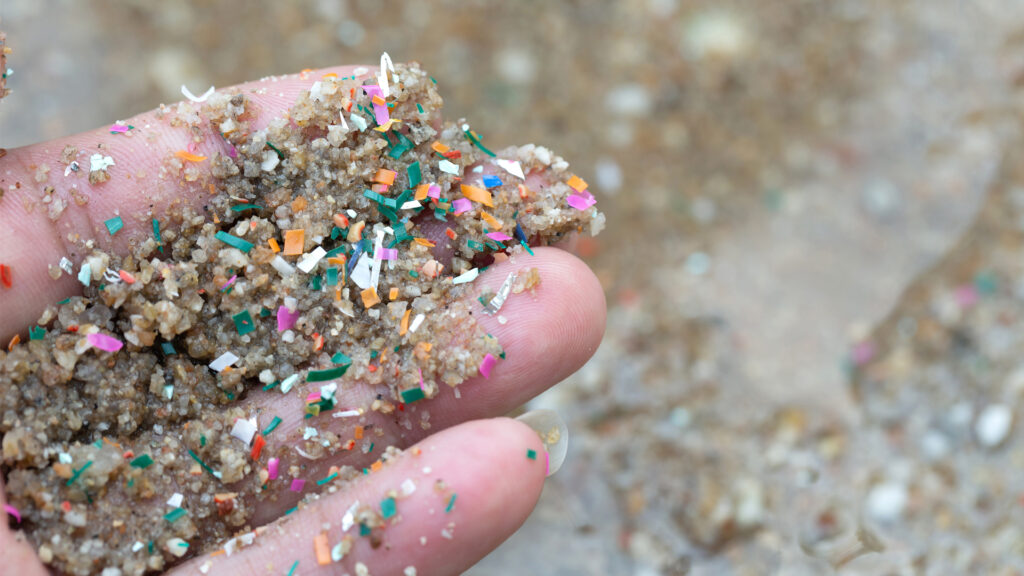By Davis Cury
The human body is made up of 70% water, but how much is made up of plastic? According to a 2019 World Wildlife Foundation study from Australia, it is estimated that an average person could consume around 5 grams of plastic per week — the same amount of plastic that is in a credit card.
The same study states the ocean is a major reservoir for microplastic contamination, according to the Wildlife Foundation, which puts coastal cities like Jacksonville at increased risk for exposure to these contaminants. The harm they can cause has yet to be well-understood but has rapidly become a focus for scientific research organizations nationwide.
For example, a new study published in the New England Journal of Medicine showed that microplastics can play a role in certain blood vessel diseases — affecting over 18 million Americans — by becoming components of blood vessel blockages in our bodies.

As medical students, we hope to raise awareness of the prevalence of microplastics in our ocean communities and their harmful effects on our bodies.
In the 1960s, microplastics began receiving patents for use in cosmetics and personal care items. Pharmaceutical companies and beauty brands saw the cost-saving potential of replacing naturally derived ingredients such as ground nut shells, sea salt or pumice stone, and opted for a cheap-to-produce alternative known as polyethylene.
Soon after, everything from lotion to lipstick contained petroleum-based plastics designed to be small enough to exfoliate skin, meaning they easily bypassed water treatment systems and began circulating in the ocean. In 2012, the United Nations Environmental Program found that countries in the European Union alone used over 4,400 tons of cosmetic-grade polyethylene microbeads, some smaller than a human hair.
The 2015 U.S. congressional Microbead-Free Waters Act instituted a ban on the use of microbeads in personal care items, but the largest generator of ocean microplastics (textile manufacturers) has yet to face sanctions or provide solutions.
New research has shed light on the concerning link between microplastics and a variety of health concerns, one being cardiovascular disease. Microplastics can be ingested, inhaled or enter through skin; They also have a toxic effect on the organs and tissues.
A prospective observation study conducted by researchers in Italy has uncovered some of the consequences of using plastics in our everyday lives. The study showed that patients who exhibited carotid artery plaque containing microplastic particles had a 4.5 times greater risk of myocardial infarction, stroke or death. That’s compared to patients who exhibited carotid artery plaque in the absence of microplastic particles.

Additionally, the plaques that contained microplastics exhibited greater inflammatory properties. The implications of this study are that microplastics can damage the lining of blood vessels, leading to a greater risk of plaque formation and ultimately a detrimental cardiovascular event. This underscores the importance of efforts to mitigate microplastic pollution and safeguard cardiovascular health.
Although we’ve known for years that microplastics are harmful to our environment, the latest research suggests a detrimental relationship to our health — specifically, our heart health. Spreading awareness of this issue is key to solving the problem, as it allows us to make informed decisions as a state, a community and as individuals.
On a larger scale, policy changes aimed at reducing levels of pollution in our environment should be on the table. On a smaller scale, we can all take steps toward better heart health. The National Heart, Lung and Blood Institute recommends prioritizing better sleep, healthy eating, regular exercise and other strategies to promote personal health.
As future physicians and lifelong Floridians, we want what’s best for our state, our neighbors and our patients. That’s why we must work together to raise awareness of this potential health risk and join in efforts to mitigate the ever-rising levels of microplastics in our communities.
This piece was written by Davis Cury, a Jacksonville resident and first-year medical student at the University of Florida College of Medicine, with Brandon Climenhage, Kara Holt, Nina Sharifi and Benjamin Meyer. All authors will spend time at UF Health’s Jacksonville campus as part of their medical education.
This opinion piece was originally published by the Florida Times-Union, which is a media partner of The Invading Sea. If you are interested in submitting an opinion piece to The Invading Sea, email Editor Nathan Crabbe at ncrabbe@fau.edu. Sign up for The Invading Sea newsletter by visiting here.



